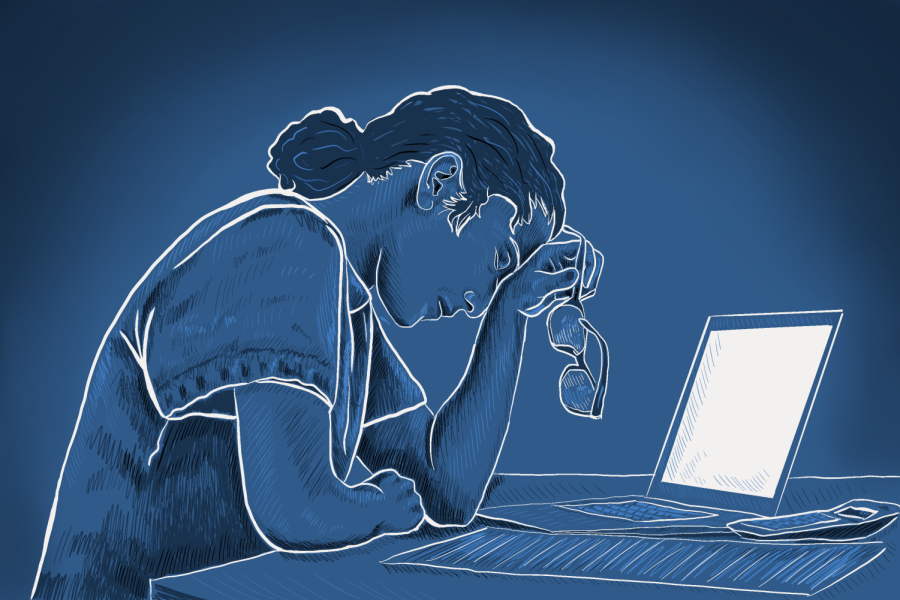Students reflect on balancing sleep schedules with academics, other responsibilities
Northwestern students choose to stay up later to complete their schoolwork, following later time commitments.
February 19, 2023
Every Wednesday at 4:40 a.m., McCormick freshman Julia Davis wakes up, puts her uniform on and walks up to the Naval Reserve Officers Training Corps house for training.
Early morning wakeups are a habit for Davis, who chooses to wake up nearly every day at times others may consider early.
“If I’m sleeping in, that’s like 8 a.m., and I’ll only do that once a week,” she said. “It makes me feel really bad if I wake up any later because I just feel like I just wasted my day.”
Northwestern students have a variety of different sleeping habits, which typically accommodate their schoolwork, jobs, extracurriculars and other responsibilities. As a result, many students have to compromise between these time-consuming activities and their sleep.
An adult needs about seven to eight hours of sleep, said Feinberg Prof. Kristen Knutson. However, according to the Centers for Disease Control and Prevention, one in three American adults do not regularly get enough sleep on a daily basis.
Sleep deprivation is linked to many health issues including short-term problems like mood disorders, and impaired cognitive function and memory, Knutson said. She added that in the long term, sleep deprivation can lead to an increased risk of cardiovascular disease and a higher chance of developing diabetes or cancer.
The American Heart Association added sleep as a heart disease health factor in June 2022.
While not getting enough sleep for four years won’t necessarily lead to severe health consequences, college is a critical time to set healthy habits, Knutson said.
“Similar to diet and exercise, I want people to start thinking of healthy sleep as part of a healthy lifestyle,” Knutson said. “We may not always reach those goals on every single day, but that is the lifestyle.”
On Mondays, Weinberg freshman Jessica Guo is given computer science assignments that are due Fridays, she said. As a result, she’s adjusted her sleep schedule since Fall Quarter, when she slept about eight to 10 hours a night.
Now, she wakes up at about 10 a.m., attends her classes, eats an early dinner at 5 p.m. and naps from about 6 to 7:30 p.m. before starting her homework, which will last until anytime between 1 to 3 a.m.
For Communication junior Maelea Tan, their day is ruined if they don’t get enough sleep, they said. They can’t focus and might even fall asleep at inappropriate times, as was the case during a date their senior year of high school.
Tan recalled the incident: One moment they were eating a chicken nugget at McDonald’s, and the next they were dozing off, they said.
As a theater student, Tan has tried to balance rehearsal and schoolwork. After having rehearsals until 10 p.m. for a production last academic year, they’ve since avoided similar late time commitments.
“I would have to do all my homework after 10 (p.m.), and that was not good at all,” Tan said. “I was extremely depressed and my life kind of fell apart a little bit.”
They said they once pulled an all-nighter to study for an exam, which was positive for their grade but negative for their mental health.
Sleeping at least a little before an exam or in between studying sessions can be beneficial, Knutson said.
“Ideally, you’re not cramming,” she said. “But if you have to compromise, I would definitely make sure you get some sleep in the middle there to consolidate those memories.”
Weinberg junior Jacob Jarding has mostly managed to get enough sleep in college, he said. However, he recently learned he could improve his mood by shifting his eight hours of sleep to an earlier time frame.
Before Fall Quarter, Jarding’s sleep schedule involved going to bed around 1 a.m. and waking up eight hours later. But, when he studied abroad this fall on Carleton College’s Buddhist Studies in Bodh Gaya, India program, he’d consistently wake at 5 a.m., meditate, have classes until 12 p.m. and sleep as early as 8 p.m.
After returning to Evanston for Winter Quarter, he decided he would go to bed at 11 p.m. and wake up around 6 or 7 a.m. most days to maximize his hours of sunlight.
He said he feels more motivated and is in a better mood when the sun is up.
“I don’t consider myself Buddhist, but (I’m) trying to import some of that conscientiousness and mindfulness into my life,” he said.
Email: taliawiniarsky2026@u.northwestern.edu
Twitter: @winiarskyT
Related stories:
— Northwestern-led study looks inside the brain to observe memory storage during sleep
— Study co-led by NU professor reveals increased mortality for ‘night owl’ individuals
— 560 Lincoln and Kemper residents struggle to sleep amidst construction on Campus Drive



